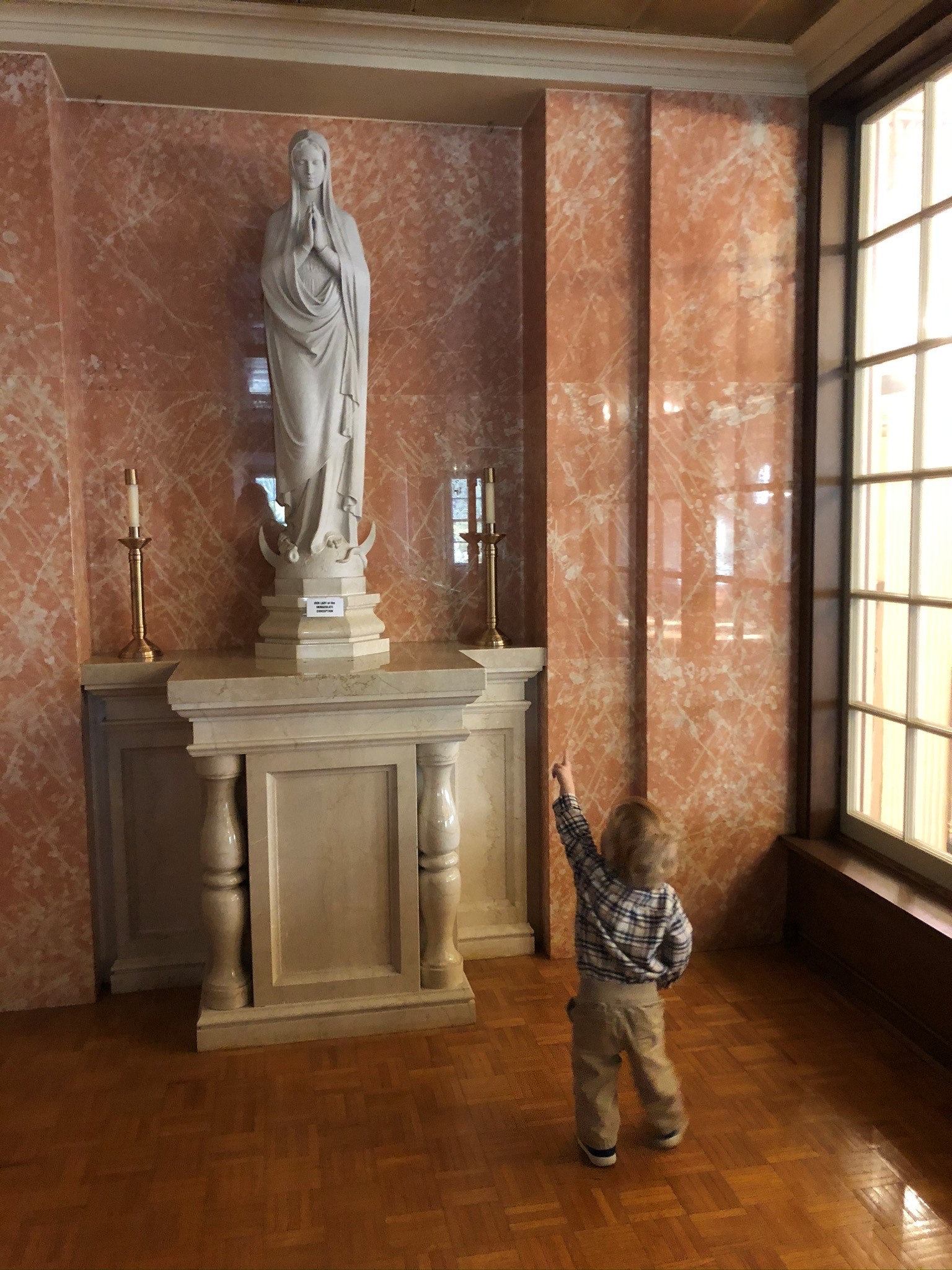Milwaukee Catholic Mamas

A statue of Mary in the chapel at Christ King Parish in Wauwatosa. (Photo by Colleen Jurkiewicz)
“Mary can’t possibly empathize with my situation. She never sinned, she had one child, and He was literally perfect.”
In moments of despair and frustration, this sentiment — or one just like it — has probably been uttered by Catholic mothers everywhere. When we are feeling particularly overcome by our own humanness, the chasm between our souls and that of the sinless Mother of God can seem particularly wide.
Where we are distracted by our own desires, she — seemingly effortlessly — is saying “yes” to God’s will. Where we are full of complaints, bitterness and uncertainty, she is full of the divine poise that can only be achieved through total trust in the providence of God.
In our worst moments, we can be tempted to think of Mary as the mom from school whose makeup is always perfect, whose children are immaculately behaved and who is never even a little late for the morning drop-off.
But there’s a danger in espousing such a limited view of Mary, full of grace.
Was Mary without the stain of sin? Absolutely. Was she full of grace that radiated to everyone she met? Certainly. But that doesn’t mean she lacks an intimate understanding of the struggles we face — even those we face in our own sinfulness.
To put it simply, said Fr. Dwight Campbell, pastor at Our Lady of Mt. Carmel and St. Therese of Lisieux Parishes in Kenosha: “Mary didn’t have it easy.”
Mary’s life as a Jewish woman under Roman rule would have had its own difficulties no matter what her destiny was. But from her very introduction in the Scriptures, Mary is out of the frying pan and into the fire. Due to her courageous “yes” to God’s will, she finds herself about to give birth to the Incarnate Word and sat on the back of a donkey on a 90-mile journey. Once in Bethlehem, she gives birth not in a home but in a cave. When she presents her child at the temple, she is given the news that, because of his destiny, her heart will be pierced with a sword. She is forced to abandon her extended family and community, fleeing to a foreign country to save her son’s life. When he is a young boy, he is lost for several days and she has no idea what happened to him. Years later, presumably a widow, she surrenders her only son to an arduous public ministry that she knows will end in his death. Finally, she stands at the foot of his cross as he tells her she is now mother to all those whose very sins caused his death.
Because of her sinless nature, these trials were felt by Mary even more deeply than they would be by us, said Fr. Campbell: “Her suffering was magnified in a way we can’t comprehend because of her sinlessness.”
Mary also endured the small, day-to-day annoyances that send us plummeting toward frustration and impatience. Because of her lack of original sin, she didn’t lose her patience and snap at Joseph and Jesus if dinner got burned — but that does not mean she didn’t feel the chagrin of disappointment when things went wrong.
What sets Mary apart is she is not enslaved to those emotions. That disappointment and anxiety did not cause her to sin. She has greater exercise over her free will than we do, explained Fr. Campbell.
“Being without sin, she was able to choose what was more pleasing to God,” he said. “Because she experienced everything we do, she’s a model for us. But we lose confidence in God — she never did that.”
Instead, in the face of every large and small trial, Mary trusted that God was working.
And because she knows our frailty so well, she can anticipate our own pitfalls and needs. We see this at Cana, Fr. Campbell points out. “Before we would even think of going to her in the midst of our difficulty, she’s foreseeing our troubles, because she’s been there,” he said.
So it might be true that Mary is a lot like the perfect mom, in that she is always making better decisions than we are. But if Mary was the perfect mom at school, she would also be the mom offering to drive our kids home from practice, the mom with a ready and understanding shoulder to cry on, the mom who compliments your brownies no matter how bad they are, the mom who always comes to sit next to you at assembly.
Mary never ceases trying to empower us to ask for the graces we need to be happier, holier people. She knows our human pain, but because of her sinlessness, she also knows that human pain doesn’t have the final word on who we are — not as people, and not as mothers. She has experienced the liberation that comes from looking at a lifetime of trials and saying: “Behold, the servant of the Lord. Let it be done to me according to your word.”
